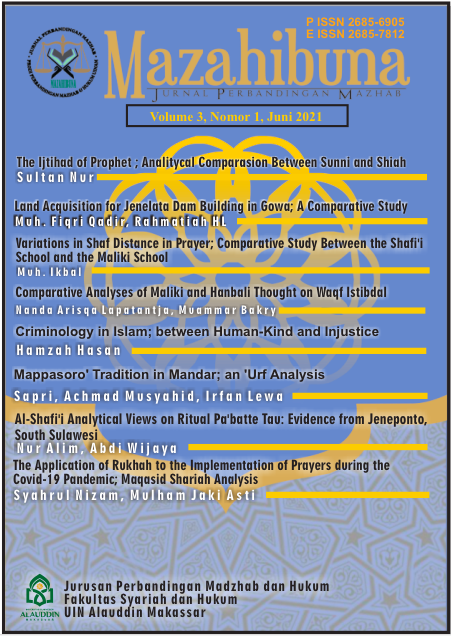Variations in Shaf Distance in Prayer; Comparative Study Between the Shafi'i School and the Maliki School
Abstract
Prayer is one of the many obligatory matters imposed on Muslims. Therefore, in carrying out prayers, it should be done specifically, such as closing the shaf for the perfection of the prayer. But the problem that then arises is due to the Corona Virus Disease (Covid 19) phenomenon or event. The government's efforts to suppress the spread of Covid 19, one of which is the distance to prayer shafts. Prayers that are spaced apart certainly create new legal problems among Muslims. The purpose of this research is to find out the legal basis for shaf salat, the argumentation of fiqh principles on shaf salat changes and the views of the Syafi'I and Maliki Schools on shaf changes. The research method used is library research which is analytical and comparative in nature. Sources of data used in this study are secondary, primary and tertiary.
Keywords: Prayer Shaf; Prayer; Imam of the School
References
A. Azizy, Ahmad Qodri. Islam dan Permasalahan Sosial: Mencari Jalan Keluar. Yogyakarta: Lkis, 2000.
Abu Abdillah, Syekh Syamsidin. Terjemah Fathul Mu’in. Surabaya: Al-Hidayah, 1996.
Al-Asqalani, Hajar, Ibnu. Fathu al-Bari bi Syarh al-Sahihi al-Buhari. Sahudi: Kitab Adzan, 2014.
Al-Haitami, Hajar, Ibnu. Tuhfatul Muhtaj bi Syarhil Minhaj. Beirut: Darul Kutub al-Ilmiyyah, 2011.
Assuyuti, Imam Bashori. Bimbingan Shalat Lengkap. Jakarta: Mitra Umat, 1998.
Azzam Muhammad, Azis Abdul dan Hawwas Sayyed Abdul Wahhab. Fiqh Ibadah. Jakarta: Amzah, 2009.
Az-Zuhaili, Wahbapp. Fiqih Islam Wa Adillatuhu, Book 2. Bekasi: Gema Insani Press, 2010.
Dahlan, Rahman. Ushul Fiqpp. Jakarta: Amzah, 2011.
Hasbi Ash Shiddieqy, Teungku Muhammad. Pedoman Shalat. Semarang: PT Pustika Riski Putra, 2000.
Hasibuanm, Imran Efendy, Shalat Dalam Perspektif Fiqh dan Tasawuf. Pub 2; Pekanbaru: CV Gema Syukran Press, 2008.
https://muslim.or.id/52382-merapatkan-dan-meluruskan-shaf-shalat-jamaapp.html. Accessed on 6 Maret 2021.
https://republika.co.id/berita/islamdigest/kajianalquran/q7mwqb166921418723000/dalil-meluruskan-shaf-shalat. Accessed on 7 Maret 2021.
https://www.hadits.id/hadits/bukhari/365. Accessed on 7 Maret 2021.
https://hadits.net/hadits/darimi/1228/. Accessed on 7 Maret 2021.
Ibrahim, Duski. Al-Qawa’id Al-Fiqhiyapp. Pub 1. Palembang: CV Amanah, 2019.
Kementrian Pendidikan dan Kebudayaan. https://kbbi.web.id/salat. Accessed on 6 Maret 2021.
Kementrian Agama RI. Al-Qur’an dan Terjemahan, Semarang: PT Karya Toha Putra,1995.
Mahalli, Ahmad Mudjab. Hadis-hadis ahkam, Riwayat Asy-Syafi’i: Thaharah dan Shalat. Pub 1; Jakarta: PT Raja Grafindo Persada, 2003.
Mustafa, Zulhasari. “PROBLEMATIKA PEMAKNAAN TEKS SYARIAT DAN DINAMIKA MASLAHAT KEMANUSIAAN.” Mazahibuna; Jurnal Perbandingan Mazhab 2, no. 1 (2020).
Rasjid, Sulaiman. Fiqh Islam: Fiqh Islam Lengkap. Pub 27; Bandung: Sinar Baru Algesindo, 2012.
Syarifuddin, Amir. Garis-garis Besar Fiqpp. Pub 1. Jakarta: Kencana, 2003.
Syatar, Abdul, Muhammad Majdy Amiruddin, and Arif Rahman. “Darurat Moderasi Beragama Di Tengah Pandemi Corona Virus Disease 2019 (Covid-19).” KURIOSITAS Media Komunikasi Sosial dan Keagamaan 13, no. 1, Juni (2020): 1–13. https://ejurnal.iainpare.ac.id/index.php/kuriositas/article/view/1376/708.

This work is licensed under a Creative Commons Attribution 4.0 International License.
Authors who publish with Mazahibuna: Jurnal Perbandingan Mazhab agree to the following terms:
- Authors retain copyright and grant the Mazahibuna: Jurnal Perbandingan Mazhab right of first publication with the work simultaneously licensed under Creative Commons Attribution License (CC BY 4.0) that allows others to share the work with an acknowledgment of the work's authorship and initial publication in this journal.
- Authors can enter into separate, additional contractual arrangements for the non-exclusive distribution of the published version of the work (e.g., post it to an institutional repository or edit it in a book), with an acknowledgment of its initial publication in this journal.
- Authors are permitted and encouraged to post their work online (e.g., in institutional repositories or on their website) before and during the submission process, as it can lead to productive exchanges, as well as earlier and greater citation of published work.

